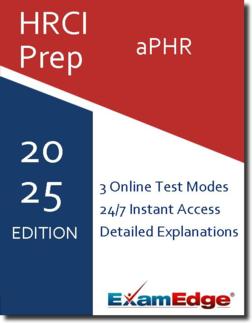HRCI aPHR™ (aPHR™) Practice Tests & Test Prep by Exam Edge - Topics
Based on 28 Reviews
- Real Exam Simulation: Timed questions and matching content build comfort for your HRCI aPHR test day.
- Instant, 24/7 Access: Web-based HRCI Associate Professional in Human Resources practice exams with no software needed.
- Clear Explanations: Step-by-step answers and explanations for your HRCI exam to strengthen understanding.
- Boosted Confidence: Reduces anxiety and improves test-taking skills to ace your HRCI Associate Professional in Human Resources (aPHR).

Understanding the exact breakdown of the HRCI Associate Professional in Human Resources test will help you know what to expect and how to most effectively prepare. The HRCI Associate Professional in Human Resources has 100 multiple-choice questions The exam will be broken down into the sections below:
| HRCI Associate Professional in Human Resources Exam Blueprint | ||
|---|---|---|
| Domain Name | % | Number of Questions |
| Talent Acquisition | 19% | 19 |
| Learning & Development | 15% | 15 |
| Compensation & Benefits | 17% | 17 |
| Employee Relations | 24% | 24 |
| Compliance & Risk Management | 25% | 25 |


